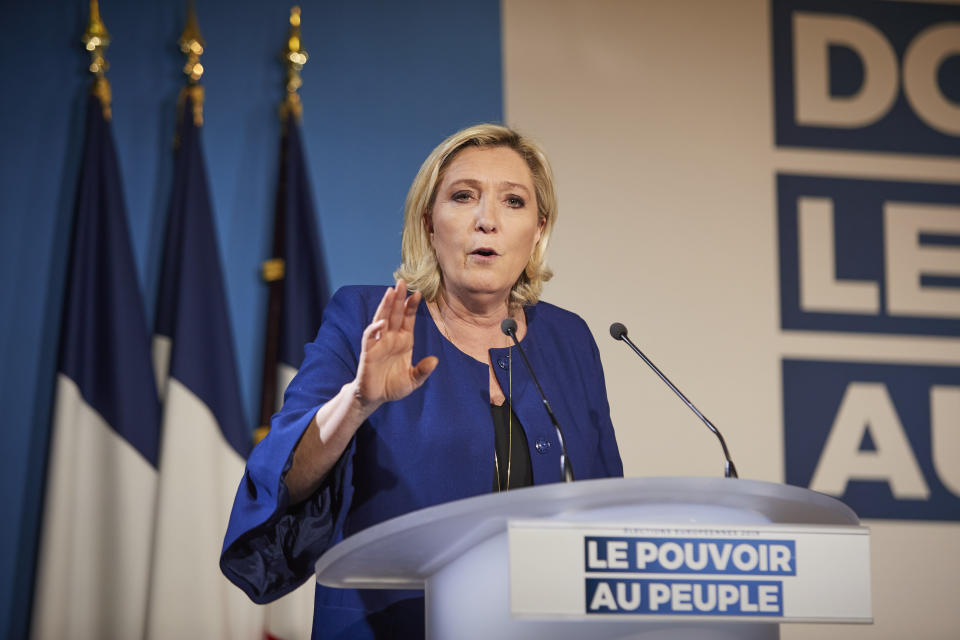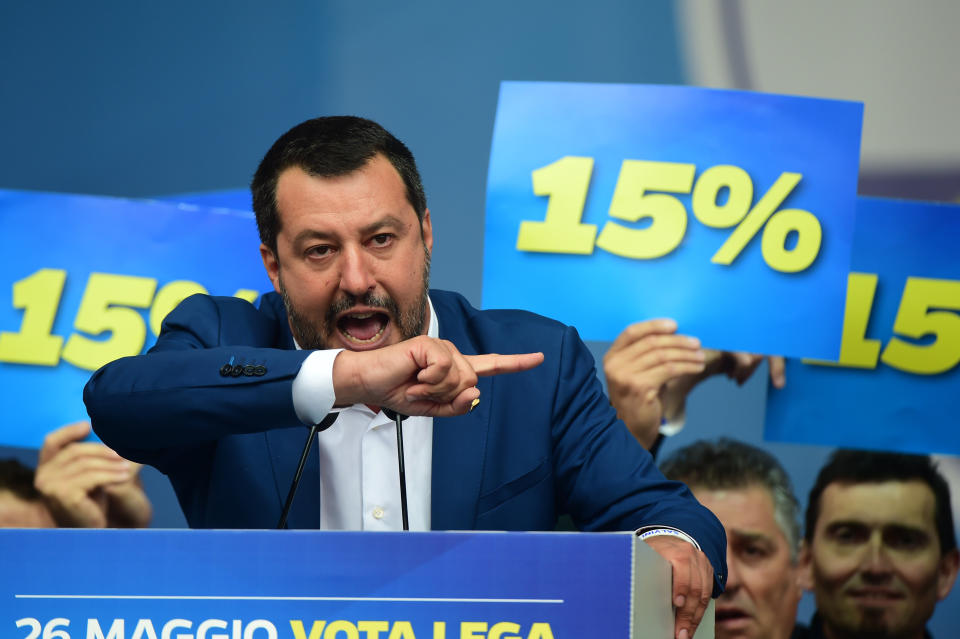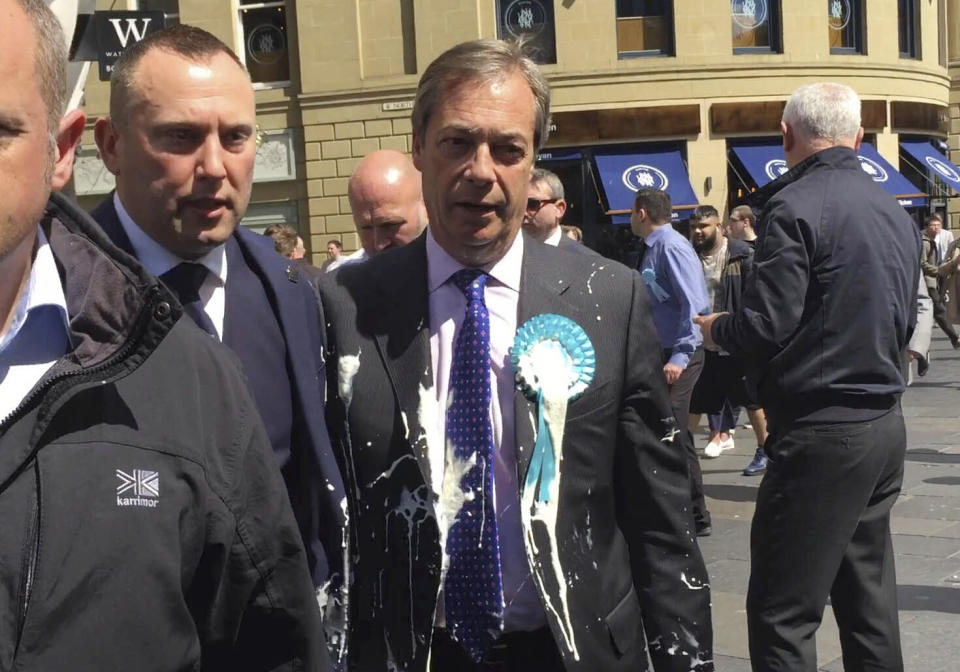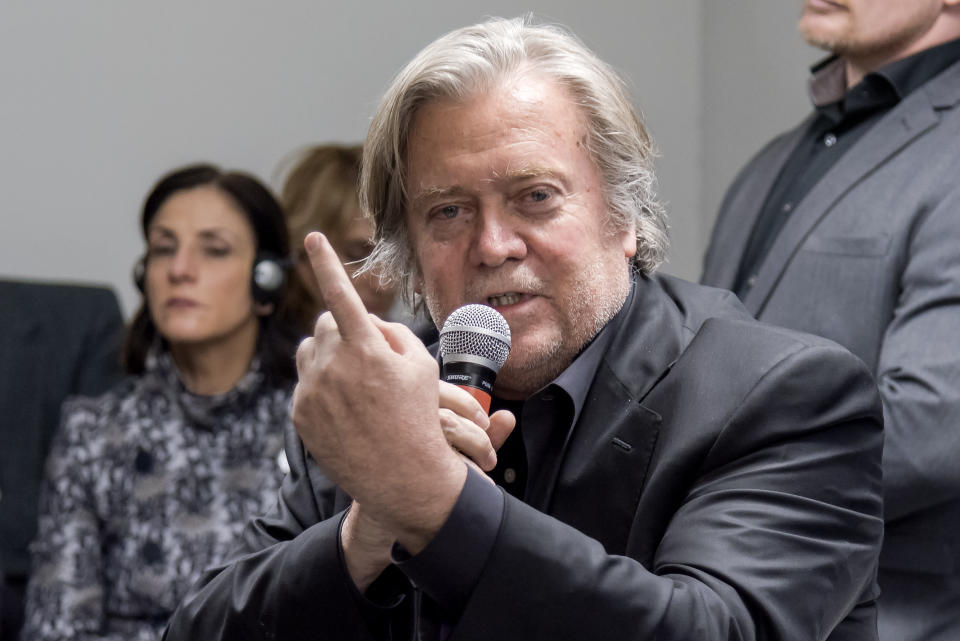Bannon stirs the pot as voting starts in crucial European elections

BARCELONA — Amid the ongoing political crisis turned soap opera sweeping Europe as elections approach to choose delegates to the EU Parliament, French President Emmanuel Macron minced no words about President Trump’s former main man Steve Bannon, who showed up in Paris to cheer on Marine Le Pen and her hard-right National Rally party.
Macron accused the ubiquitous global strategist-at-large of working with nationalists in “the dismantling of Europe” and being more “intrusive” than the Russians “in financing [and] helping extremist parties.”
His campaign manager, Stéphane Séjourné, was even more direct: Bannon’s help for the controversial Le Pen, he tweeted, “makes you want to throw up.”
Le Pen, meanwhile, who is facing potential investigations into Bannon’s role in her party’s finances, brushed off the booted White House adviser’s effusive praise of her in the Paris media, acting as though he were an unwanted houseguest, even a stalker. No, she hadn’t invited the American to Paris and he had “no role in the campaign,” she told FranceInfo on Monday. She added that until she saw a news report, she didn’t know the strategist was in Paris — a claim that seemed less than totally credible when a reporter for Le Parisien said he saw two officials of her party leaving Bannon’s suite in the swanky Le Bristol Hotel last Friday.
In the voting that runs from Thursday to Sunday, citizens of 28 countries will choose 751 delegates to serve five-year terms in the European Parliament in Brussels. At stake is whether the 25-year-old EU will grow even more entwined, as Macron envisions, or give more power to its individual member countries, a position that Le Pen favors, along with over a dozen European nationalist-populist “sovereigntist” parties that Bannon has been unofficially advising over the past year. Their vision is one Trump would recognize, a Europe with guarded borders, more walls and an end to cooperation in fighting climate change.

Despite their differences, both Macron and Bannon see the election as the most important vote in the history of the European Union, with Macron warning that the EU faces “an existential threat” from the parties that Bannon has been advising.
The upcoming election will also become a vote of confidence (or not) in the French president, who, with German Chancellor Angela Merkel scheduled to retire in 2021, has positioned himself as the power man and savior of the European Union. “Macron is in free fall,” Bannon told Yahoo News. “Not one other centrist leader has joined him in his ‘Renaissance’ project to save the EU — not one. Even Merkel backed off.” Bannon says Macron “made this election a referendum on himself and his presidency. He risked it all. If he comes up short … his presidency is essentially over.”
“It’s a big deal in France,” says Susi Dennison, director of the European Power program at the European Council on Foreign Relations, who likens it to the U.S. midterms. French voters see the election as an opportunity to give Macron, whose popularity has plummeted amid the violent yellow vest protests, “a kick in the mouth.”
Bannon predicts Le Pen’s National Rally, currently leading Macron’s La République en Marche party by a hair, will win a plurality of the French delegates to the EU Parliament. And across the continent, he says, nationalist-populist parties will take more than 30 percent of seats, and when Parliament convenes in July they will vote as a bloc to block passage of budgets, legislation and key appointments to the upper political echelons of the EU.
If that happens, he says, “each day will be a war to the knife.”
But France is only one country that appears rocky this week. Austria looks entirely unhinged. The problem: a video shot two years ago on Spanish party island Ibiza. In the video, which first emerged in the German press on Friday, Heinz-Christian Strache — leader of Austria’s nationalist Freedom Party, who became Austria’s vice chancellor in 2017 — is chatting up a young woman who claimed to be the niece of a Russian oligarch, advising her how to clean up “dirty money.” Among the ideas of the man who would soon become the second-ranking official in Austria’s government: to funnel her 250 million euros to his Freedom Party or invest in a tabloid and make it a cheering section for the party. In exchange he appears to dangle government contracts.

Strache resigned last Saturday, and on Monday, the rest of his party quit their posts as well. Chancellor Sebastian Kurz called for a snap election in September, but now he’s looking at a vote of no confidence for bringing the Freedom Party into the government at all.
And immediately, centrist parties began sending the message to voters continentwide — see, this is what happens when you elect those nationalist-populists.
With Strache about to step down, he abruptly canceled a planned trip to Milan to take part in a demonstration intended to show the power of the nationalist right: the first rally of a pan-European alliance founded by Italy’s hot-headed Deputy Prime Minister Matteo Salvini. Salvini is a close ally of Bannon, who wrote an essay for Time’s recent “100 Most Influential People” issue, calling the Italian the man who “resurrected Italy’s national pride.”
Beyond Le Pen’s party and the anti-Islamic Party of Freedom of Dutchman Geert Wilders, another eight hard-right parties had signed on to Salvini’s new European Alliance of People and Nations. That includes the infamous Conservative People’s Party of Estonia (EKRE), an ethno-nationalist party headed by that country’s former ambassador to Russia, Mart Helme, and his son, Martin. When the Helmes’ 7-year-old party came in third in March elections, EKRE was tapped to form a coalition government — and Mart became Estonia’s interior minister, while Martin took the finance portfolio. The father and son snagged headlines worldwide when, at their swearing-in ceremony, they flashed the white supremacist “OK sign” for the camera.
Le Pen apparently didn’t read the headlines, however, because when she visited Tallinn, Estonia, last week, someone snapped a shot of her making the hand gesture alongside a smiling party member, Ruuben Kaalep, 25-year-old leader of the youth wing, who was also making the sign. When Kaalep published the shot on Facebook, Le Pen demanded it be taken down, saying she’d had no inkling of what the symbol actually meant.

But the star of the rally held in Piazza del Duomo was predictably the selfie-happy “Il Capitano” — Matteo Salvini, Italy’s most popular and most controversial politician, perhaps more so now since he launched a game show, “Win Salvini,” on Facebook Live; the first prize is a chance to meet him. As head of the anti-immigration party La Lega and interior minister, Salvini launched a new policy at Italy’s ports of turning back nongovernmental organization (NGO) rescue vessels that plucked drowning African migrants from the Mediterranean. The move was condemned internationally, including by EU leaders, but it was popular among many Italians — emboldening him to push a bill to fine NGOs 5,500 euros (about $6,000) for every migrant they saved who set foot on Italian soil.
Some, however, including members of his ruling coalition, which appears to be unraveling, find him brash and extreme. Others are alarmed by his Mussolini-like behaviors, such as quoting from Il Duce or giving a speech from a balcony notorious for having been the site where Mussolini watched the executions of partisans. His evident respect for Vladimir Putin, whose picture was on a shirt Salvini wore to the European Parliament, hasn’t been universally appreciated, either.
And while professing to be a staunch Catholic, Salvini has yet to meet with Pope Francis. He has been photographed holding up a T-shirt emblazoned with the words “Benedict is my pope,” referring to the last pope, Benedict XVI, a traditionalist in contrast to Francis, who has emphasized the duty of charity toward migrants and the poor.

But all that didn’t matter last Saturday — if it mattered to Salvini at all — as he strutted across the stage, upon which stood leaders of many of the most hard-core parties in Europe.
While several thousand protesters chanted “Fascists, leave Milan!” Salvini said to some 20,000 supporters, “In this piazza, there are no extremists. There are no racists. There are no fascists!
“Here, you won’t find the far right,” he continued, “but the politics of good sense. The extremists are those who have governed Europe for the past 20 years!”— namely, the EU, which he accused of an “illegal occupation” of Italy.
Meanwhile, in Britain, which hasn’t yet left the EU — a failure by Prime Minister Theresa May that forced her Friday to announce that she soon will be stepping down — Brexit mastermind Nigel Farage was in the midst of an equally jubilant campaign, his new Brexit Party looking like a good bet to come out ahead in the EU Parliament vote. Prime Minister Theresa May’s inability to pass a Brexit plan led Friday to her announcing her intention to resign. But in a peculiarly British form of backlash, on Monday he was doused by a protester wielding a banana-salted-caramel milkshake while campaigning in Newcastle; on Wednesday he was reportedly trapped on his campaign bus by protesters “armed with milkshakes.” Perhaps more painful was news that the European Parliament, in which Farage had previously held a seat, would be looking into some $570,000 of undisclosed donations from insurance tycoon Arron Banks, who admitted bankrolling Farage’s lifestyle, including the cost of a car and driver, a tony house in Chelsea and visits to the U.S., including one in 2016 when he met with Donald Trump.

But despite the last-minute scandals and airborne milkshakes, the European picture was shaping up nicely for Bannon, a correction to the defeat of Le Pen by Macron in the 2017 French presidential election. “Two years ago, it appeared the populist revolt may have peaked,” he says, ticking off various setbacks, including Le Pen’s loss, the special counsel investigations of Trump, Salvini’s La Lega’s dismal performance at the polls and Farage’s temporary retirement from politics. What’s happening in 2019, he says, “is a stunning reversal of fortune — the movement is on the march across the European continent and throughout the world.”
He points to the surprise election of conservative Prime Minister Scott Morrison in Australia on Sunday, followed by the reelection of India’s populist prime minister Narendra Modi as “incredible wins.” And by Sunday night, he says, “Salvini in Italy, Farage in the U.K. and Le Pen in France could head the three largest national parties in the EU.”
Roland Freudenstein, deputy director and head of research at Wilfried Martens Centre for European Studies, thinks Bannon is dreaming about the hard right taking 30 percent of seats in Parliament. “That’s not going to happen,” he says. According to current polling, “the numbers just aren’t there.”
ECFR’s Dennison isn’t so sure. Europeans feel confused, she says, and given “a big disconnect between voters and the political system,” they are not feeling loyal to traditionally popular parties, creating a “volatile political landscape”— all the more with 97 million undecided voters in ECFR’s recent poll. Will the “undecideds” bother to vote in these parliamentary elections, which typically have turnouts of less than 50 percent? “That’s the big question,” she says.
Right now, only one thing is a given: If Le Pen looked out her window Thursday and saw a private plane carrying Bannon in the direction of Kazakhstan, where the strategist will be speaking at a geopolitical seminar, she assuredly heaved a sigh of relief.
French election authorities have notified Le Pen that they are counting Bannon's lavish on-air praise for her as part of her party’s official airtime, which can’t exceed a certain length.
Just don’t tell her that the American plans to return to Paris on Sunday to watch the election results come in.

Melissa Rossi is an American journalist based in Western Europe.
_____
Read more from Yahoo News:


